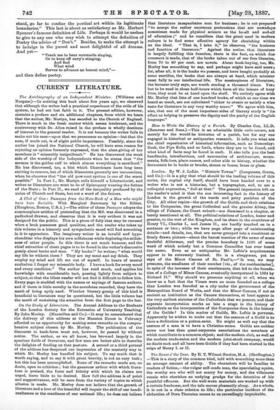London. By W. J. Loftie. "Historic Towns." (Longmans, Green, and
Co.)—It is a pity that what should be the leading volume of this series, the capital city itself, should have been banded over to a writer who is not a historian, bat a topographer, and, to use a colloquial expression, " dull at that." The general impression left on the reader's mind is that the one interesting fact in the history of London is the growth of the wards and petty parishes of the City. All other topics—the growth of the Guilds and their relations to the Companies, the great Cathedral and the greater Abbey, the village of Palaces, the Court suburb—are dismissed in a chapter, or barely mentioned at all. The political relations of London, lesser and greater, to the rest of the Kingdom, and its share in the overthrow of Henry VI., Charles I., and James II., are hardly touched on in a sentence or two ; while we have page after page of uninteresting details—and details, too, that are never grouped into a consistent or firmly drawn picture—about the barest mention of the name of some doubtful Alderman, and the precise boundary in 1100 of some ward of which nobody but a Common Councillor has ever heard the name. Even as an antiquarian Mr. Leftie's acquirements appear to be extremely limited. He is a clergyman, yet he says of the Minor Canons of St. Paul's,—" It was, we may presume, the smallness of their number [viz , of the residentiaries), in spite of the increase of their emoluments, that led to the founda- tion of a College of Minor Canons, eventually incorporated in 1394 by Richard II." Why should we presume anything at all, when we know as a fact that the Vicars were no more founded as a college than London was founded as a city under the government of the Metropolitan Board of Works, and that the Minor Canons, if not as ancient an institution as the Canons themselves, at least appear in the very earliest statutes of the Cathedrals that we possess, and their separate incorporation marks as late a stage in the history of Cathedrals as the incorporation of the Companies does in the history of the Guilds ? In this matter of Guilds, Mr. Loftie is perverse. Apparently he wishes to make out that the essence of a Guild is to have a dedication or a patron-saint. Ho might as well say that the essence of a man is to have a Christian-name. Gailde are neither more nor less than quasi-corporate associations the members of which contribute to a common object; and the modern club, as well as the modern trade-onion and the modern joint-stook company, would no doubt each and all have been Guilds if they had been started in the reign of Henry I. or II.


































 Previous page
Previous page